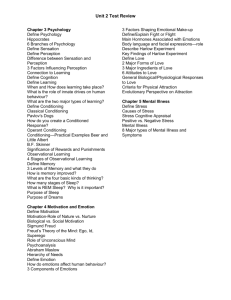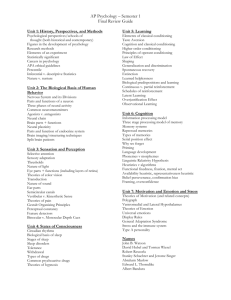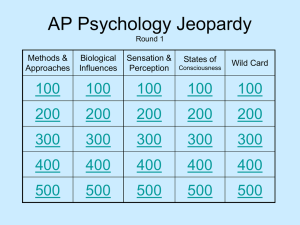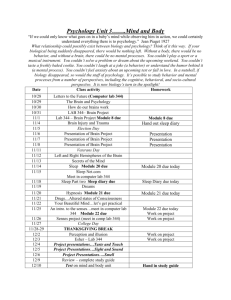Psychology - Part I - Galena High School
advertisement
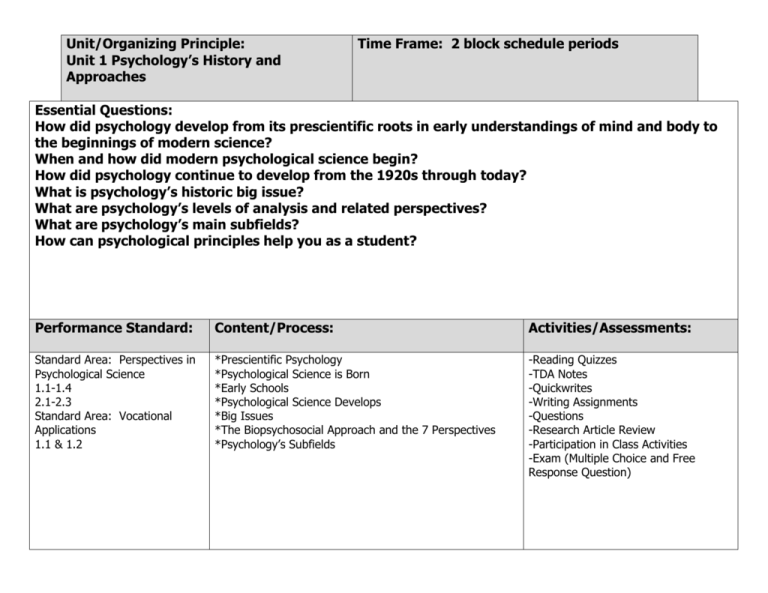
Unit/Organizing Principle: Unit 1 Psychology’s History and Approaches Time Frame: 2 block schedule periods Essential Questions: How did psychology develop from its prescientific roots in early understandings of mind and body to the beginnings of modern science? When and how did modern psychological science begin? How did psychology continue to develop from the 1920s through today? What is psychology’s historic big issue? What are psychology’s levels of analysis and related perspectives? What are psychology’s main subfields? How can psychological principles help you as a student? Performance Standard: Content/Process: Activities/Assessments: Standard Area: Perspectives in Psychological Science 1.1-1.4 2.1-2.3 Standard Area: Vocational Applications 1.1 & 1.2 *Prescientific Psychology *Psychological Science is Born *Early Schools *Psychological Science Develops *Big Issues *The Biopsychosocial Approach and the 7 Perspectives *Psychology’s Subfields -Reading Quizzes -TDA Notes -Quickwrites -Writing Assignments -Questions -Research Article Review -Participation in Class Activities -Exam (Multiple Choice and Free Response Question) Unit/Organizing Principle: Unit 7A Cognition: Memory Time Frame: 4 block periods Essential Questions: How do psychologists describe the human memory system? What information do we encode automatically? What information do we encode effortfully, and how does the distribution of practice influence retention? What effortful processing methods aid in forming memories? What is sensory memory? What are the duration and capacity of short-term and long-term memory? How does the brain store our memories? How do we get information out of memory? How do external contexts and internal emotions influence memory retrieval? Why do we forget? How do misinformation, imagination, and source amnesia influence our memory construction? How real-seeming are false memories? What is the controversy related to claims of repressed and recovered memories? How can an understanding of memory contribute to more effective study techniques? Performance Standard: Content/Process: Activities/Assessments: Standard Area: Memory 1.1-1.3 2.1-2.4 3.1-3.5 *Computer Information-Processing System Model --Encoding, Storage, Retrieval *Atkinson-Shiffrin Three-Stage Processing Model *Contemporary Modified Version of the Three-Stage Model *How We Encode *Effortful Processing Methods *Sensory Memory—Iconic and Echoic Memory *Duration and Capacity of Short-Term Memory *Brain’s Role in Storing Memories *Retrieval *Forgetting *Memory Construction *Repressed and Recovered Memories *Improving Memory -Reading Quizzes -TDA Notes -Quickwrites -Writing Assignments -Questions -Research Article Review -Participation in Class Activities -Exam (Multiple Choice and Free Response Question) Unit/Organizing Principle: Unit 2 Time Frame: 4-6 block schedule periods Research Methods: Thinking Critically With Psychological Science Essential Questions: Why are the answers that flow from the scientific approach more reliable than those based on intuition and common sense? What are three main components of the scientific attitude? How do theories advance psychological science? How do psychologists observe and describe behavior? What are positive and negative correlations, and why do they enable prediction but not cause-effect explanation? What are illusory correlations? How do experiments, powered by random assignment, clarify cause and effect? How can we describe data with measures of central tendency and variation? What principles can guide our making generalizations from samples and deciding whether differences are significant? Can laboratory experiments illuminate everyday life? Does behavior depend on one’s culture and gender? Why do psychologists study animals, and is it ethical to experiment on animals? Is it ethical to experiment on people? Is psychology free of value judgments? Performance Standard: Content/Process: Activities/Assessments: Standard Area: Research Methods, Measurement, and Statistics *The Need for Psychological Science *The Scientific Attitude *Critical Thinking -Reading Quizzes -TDA Notes -Quickwrites 1.1-1.4 2.1 & 2.2 3.1-3.6 *Scientific Method *Description *Correlation *Experimentation *Describing Data *Making Inferences *Ethical Guidelines for Experiments Unit/Organizing Principle: Unit 3A Biological Bases of Behavior: Neural Processing and the Endocrine System -Writing Assignments -Questions -Research Article Review -Participation in Class Activities -Exam (Multiple Choice and Free Response Question) Time Frame: 1-2 block schedule periods Essential Questions: What are neurons, and how do they transmit information? How do nerve cells communicate with other nerve cells? How do neurotransmitters influence behavior, and how do drugs and other chemicals affect neurotransmission? What are the functions of the nervous system’s main divisions? How does the endocrine system—the body’s slower information system—transmit its messages? Performance Standard: Content/Process: Activities/Assessments: Standard Area: Biological Bases of Behavior 1.1-1.3 2.1 & 2.2 *Neurons *Neuron Communication *Neurotransmitters and their Functions *The Peripheral Nervous System *The Central Nervous System *The Endocrine System -Reading Quizzes -TDA Notes -Quickwrites -Writing Assignments -Questions -Research Article Review -Participation in Class Activities -Exam (Multiple Choice and Free Response Question) Unit/Organizing Principle: Unit 3B Biological Bases of Behavior: The Brain Time Frame: 2-3 block schedule periods Essential Questions: How do neuroscientists study the brain’s connections to behavior and mind? What are the functions of important lower-level brain structure? What functions are served by the various cerebral regions? What brain areas are involved in language processing? To what extent can a damaged brain reorganize itself? What do split brains reveal about the functions of our two brain hemispheres? How does handedness relate to brain organization? What is the “dual processing” being revealed by today’s cognitive neuroscience? Performance Standard: Content/Process: Activities/Assessments: Standard Area: Biological Bases of Behavior 1.4 & 1.5 4.1-4.3 *Tools of Discovery *Brain Structures and Functions *Language and the Brain *Brain Plasticity and Neurogenesis *Split-Brain Research *Handedness and Brain Organization *Consciousness -Reading Quizzes -TDA Notes -Quickwrites -Writing Assignments -Questions -Research Article Review -Participation in Class Activities -Exam (Multiple Choice and Free Response Question) Unit/Organizing Principle: Unit 3C Biological Bases of Behavior: Genetics, Evolutionary Psychology, and Behavior Time Frame: 2-3 block schedule periods Essential Questions: What are genes, and how do behavior geneticists explain our individual differences? What is heritability, and how does it relate to individuals and groups? What is the promise of molecular genetics research? How do evolutionary psychologists use natural selection to explain behavior tendencies? How might an evolutionary psychologist explain gender differences in sexuality and mating preferences? What are the key criticisms of evolutionary psychology? Performance Standard: Content/Process: Activities/Assessments: Standard Area: Biological Bases of Behavior 3.1-3.3 *Genes *Twin and Adoption Studies *Heritability *Gene-Environment Interaction *Molecular Genetics—Future Horizons *Evolutionary Psychology -Reading Quizzes -TDA Notes -Quickwrites -Writing Assignments -Questions -Research Article Review -Participation in Class Activities -Exam (Multiple Choice and Free Response Question) Unit/Organizing Principle: Unit 4 Sensation and Perception Time Frame: 4 block schedule periods Essential Questions: What are sensation and perception? What do we mean by bottom-up processing and top-down processing? How are we affected by selective attention? What are the absolute and difference thresholds, and do stimuli below the absolute threshold have any influence? What is the function of sensory adaptation? What is the energy that we see as visible light? How does the eye transform light energy into neural messages? How does the brain process visual information? What theories help us understand color vision? What are the characteristics of air pressure waves as we hear sound? How does the ear transform sound energy into neural messages? What theories help us understand pitch perception? How do we locate sounds? What are the common causes of hearing loss, and why does controversy surround cochlear implants? How do we sense touch and sense our body’s position and movement? How do we experience pain? How do we experience taste? How do we experience smell? How did the Gestalt psychologists understand perceptual organization? How do figure-ground and grouping principles contribute to our perceptions? How do we see the world in three dimensions? How do we perceive motion? How do perceptual constancies help us organize our sensations into meaningful perceptions? What does research on sensory restriction and restored vision reveal about the effects of experience? How adaptable is our ability to perceive? How do our expectations, contexts, and emotions influence our perceptions? What are the claims of ESP, and what have most research psychologists concluded after putting these claims to the test? Performance Standard: Content/Process: Activities/Assessments: Standard Area: Sensation and *Basic Principles -Reading Quizzes Perception 1.1 & 1.2 2.1-2.4 3.1-3.6 -Selective Attention, Thresholds, Sensory Adaptation *Vision -Light Energy, the Eye, Visual Information Processing, Color Vision *Hearing -Sound Waves, the Ear, Hearing Loss and Deaf Culture *Other Senses -Touch, Pain, Taste, Smell *Perceptual Organization -Form Perception, Depth Perception, Motion Perception, Perceptual Constancy *Perceptual Interpretation -Sensory Deprivation and Restored Vision, Perceptual Adaptation, Perceptual Set *Extrasensory Perception Unit/Organizing Principle: Unit 5 States of Consciousness -TDA Notes -Quickwrites -Writing Assignments -Questions -Research Article Review -Participation in Class Activities -Exam (Multiple Choice and Free Response Question) Time Frame: 2 block schedule periods Essential Questions: How do our biological rhythms influence our daily functioning? What is the biological rhythm of our sleep? How does sleep loss affect us? What is sleep’s function? What are the major sleep disorders? What do we dream? What is the function of dreams? What is hypnosis, and what powers does a hypnotist have over a hypnotized subject? Is hypnosis an extension of normal consciousness or an altered state? What are tolerance, dependence, and addiction, and what are some common misconceptions about addiction? What are depressants, and what are their effects? What are stimulants, and what are their effects? What are hallucinogens, and what are their effects? Why do some people become regular users of consciousness-altering drugs? Performance Standard: Content/Process: Activities/Assessments: Standard Area: Consciousness 1.1 & 1.2 2.1-2.5 3.1-3.4 4.1-4.3 *Sleep -Circadian Rhythm, Sleep Stages, Alpha Waves, Delta Waves, NREM Sleep, REM Sleep *The Effects of Sleep Loss *Sleep’s Function—Various Theories *Sleep Disorders -Insomnia, Narcolepsy, Sleep Apnea, Night Terrors, Sleepwalking, Sleeptalking *Function of Dreams—Five Major Views *Hypnosis -Facts & Falsehoods, the Hypnotic state, Posthypnotic Suggestion, Dissociation *Psychoactive Drugs—Tolerance, Withdrawal Physical Dependence, Psychological Dependence, Addiction -Depressants and their Effects -Stimulants and their Effects -Hallucinogens and their Effects -Reading Quizzes -TDA Notes -Quickwrites -Writing Assignments --Questions -Research Article Review -Participation in Class Activities -Exam (Multiple Choice and Free Response Question) Unit/Organizing Principle: Unit 6 Learning Time Frame: 3 block schedule periods Essential Questions: What are some basic forms of learning? What is classical conditioning, and how did Pavlov’s work influence behaviorism? How does a neutral stimulus become a conditioned stimulus? In classical conditioning, what are the processes of acquisition, extinction, spontaneous recovery, generalization, and discrimination? Do cognitive processes and biological constraints affect classical conditioning? Why is Pavlov’s work important? What have been some applications of classical conditioning? What is operant conditioning, and how does it differ from classical conditioning? What are the basic types of reinforcers? How do different reinforcement schedules affect behavior? How does punishment affect behavior? Do cognitive processes and biological constraints affect operant conditioning? How might operant conditioning principles be applied at school, in sports, at work, at home, and for self-improvement? What is observational learning, and how is it enabled by mirror neurons? What is the impact of prosocial modeling and of antisocial modeling? Performance Standard: Content/Process: Activities/Assessments: Standard Area: Learning 1.1-1.3 2.1-2.4 3.1 & 3.2 *Associative Learning *Pavlov—His Experiments and Legacy *Classical Conditioning -Unconditioned Stimulus (US), Unconditioned Response (UR), Conditioned Stimulus (CS), Conditioned Response (CR), Acquisition, Extinction, Spontaneous Recovery, Generalization, Discrimination *Applications of Classical Conditioning *Operant Conditioning -Skinner’s Experiments -Positive Reinforcement, Negative Reinforcement, Primary Reinforcer, Conditioned Reinforcer, Fixed-ratio Schedule, Variable-ratio Schedule, Fixed-interval Schedule, Variableinterval Schedule, Punishment *Differences Between Classical Conditioning and Operant Conditioning *Observational Learning -Mirror Neurons -Bandura’s Experiments -Applications -Reading Quizzes -TDA Notes -Quickwrites -Writing Assignments -Questions -Research Article Review -Participation in Class Activities -Exam (Multiple Choice and Free Response Question)
